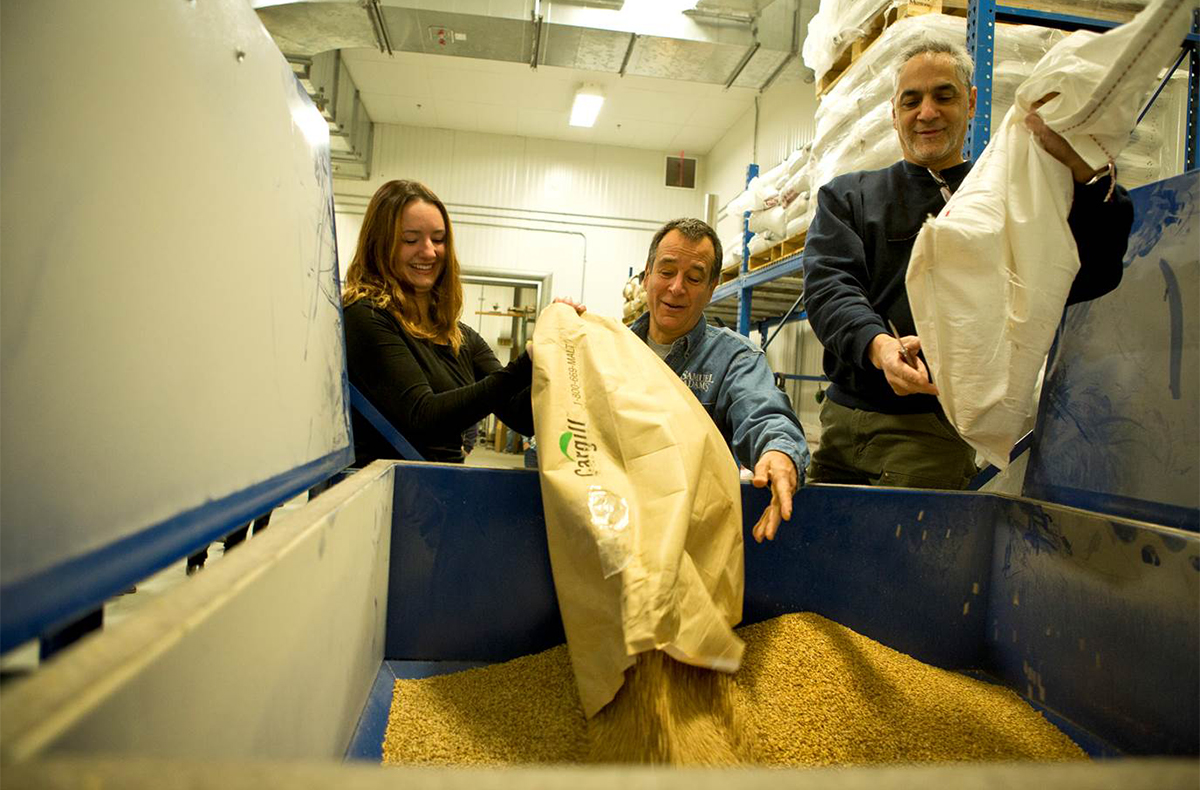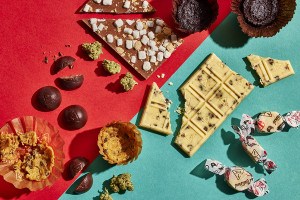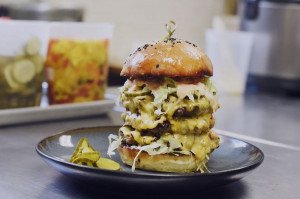Jim Koch Talks the Boston Marathon

Jacqui Webb (left), who was injured in the 2013 Boston Marathon bombing, joined Sam Adams owner Jim Koch (center) and brewer Dean Gianocostas on this year’s batch of Boston 26.2 Brew.
Samuel Adams founder and brewer Jim Koch became craft beer’s first billionaire in 2013. He’s turned The Boston Beer Company into the second-largest American-owned brewery behind DG Yuengling & Son Inc. and the top-selling craft beer in America. Koch hails from Cincinnati, but the Harvard grad (he holds a B.A., M.B.A., and J.D. from there) has made his mark in Boston.
His great-great grandfather’s 19th century lager recipe, the first batches of Sam Adams brewed in Koch’s kitchen, a briefcase full of rattling samples as he went bar-to-bar trying to sell the public on the idea of better beer; it’s a story that’s been told so often it’s now Massachusetts lore.
This Patriot’s Day marks the 30th anniversary of Koch’s acclaimed lager debuting in Boston. In that time he has not only become an advocate for craft beer—a term, he tells me, “didn’t even exist when I began”—but for the community, as well. Case in point, 2013’s Boston Marathon tragedy, in which his commemorative 26.2 Brew raised over $100,000 in immediate aid for the victims. This year, Sam Adams is once again partnering with The Greg Hill Foundation to provide ongoing support for the survivors and their families.
We caught up with Koch to discuss this year’s sessionable brew, his long history with the marathon, and the benefit of a cold beer after a long run.
How did you conceptualize this year’s version of Sam Adams’ Boston 26.2 Brew?
It’s a Gose, which is an Eastern European style originated in Leipzig. So, it was outside of the mainstream because it was brewed behind the Iron Curtain. I wanted to revive it because it’s one of those styles that’s largely been forgotten. It worked great for the marathon because it’s a wheat beer with a lighter body and lower alcohol. It’s a little more refreshing. Wheat tends to give a beer more crispness and a nice citric snap. We spice it with coriander, but also salt. Salt, of course, is a replenishing electrolyte. In some ways, it’s a very good beer to replenish what an athlete would lose from exercising. The alcohol gives you quick energy. It breaks down into available energy sources like glucose and there’s a pasta-sized portion of carbohydrates in there as well.
So you had the idea of the marathon runners drinking this beer after the race?
Oh, yeah. In fact, years ago when I first started Sam Adams, we supplied beer to the runners. I think they shut that down. But runners will tell you—and I ran the marathon a long time ago—a beer tastes really good after a race. It’s refreshing!
When were you serving beer at the marathon?
Oh gosh, back in the ’80s. It’s too bad. A lot of people appreciated it.
You obviously have a deep-rooted connection with Boston. What does the Boston Marathon mean to you and the brewery?
The marathon is one of the signature events of Boston. It’s the longest-standing marathon in the U.S. and maybe in the world [It’s the world’s longest running annual marathon]. It’s a 100-year tradition. It’s one of the things when you talk to somebody outside of the area, they all know about it. They all know the Boston Marathon.
It stayed pure for a very long time. They wouldn’t take sponsorship money and there was no prize money. You just got the laurel wreath like Pheidippides, the original marathon runner who ran from the Battle of Marathon to Athens to announce the victory. In the ’70s it was the premiere marathon, but then a bunch of others sprang up: Chicago, New York, Atlanta, etc. that had real prize money. As a marathon runner, you can only run a few. It’s not like you can run one every week at that level. So, it kind of faded into the second tier. The B.A.A. brought it back 15 to 20 years ago and made it one of the top marathons in the world again.
I ran it in the ’70s and I’ve watched the ups and downs of it. For years we would do some of the small sponsorships like provide beer for the carbo-loading at the spaghetti dinner beforehand. Originally, we had Tommy Leonard serving Sam Adams at the Eliot Lounge. The Eliot Lounge is where all the runners would hang out and then go to after the race. Our first involvement was providing cases of beer for Tommy to serve to the runners.
I remember being at a bar on the night of last year’s tragedy and the bartender told me that proceeds from the 26.2 beer were going to The Greg Hill Foundation. When did you make that decision and how were you able to implement it so quickly?
It was actually pretty easy. We’re not a big company. We live here and we had probably 40 people working the marathon. As soon as it happened we set up a phone contact chain to account for everybody. It was an immediate thing. First, we wanted to find out if everyone was okay and then we started to ask ourselves how we could help the people who were injured. I had some exposure to these types of things before and one of the problems is that dispersing money can take months. People caught in these kinds of events have an immediate need. They’re not working and they can’t get out of the ER without paying their bills. I realized there was going to be a big fund set up to deal with some of these long-term issues, but some needed money right away. We have worked in the past with The Greg Hill Foundation, he’s got a foundation where all the paperwork and tax numbers are set up and he has people in place who are ready to write checks. We raised $100,000. So you’ve got $100,000, but you still need a way to get it to the people who need it the most. Greg’s foundation can get that done right away, so we started gathering money to get it to the victims immediately.
You invited some of the families that were affected by the marathon bombing to help brew the beer. What was that experience like?
They get invited to a lot of events now and most of the time they’re asked to speak and tell their story, which is very moving. We wanted to do something that would be fun and entertaining for them. No one had to tell their story. We just invited them down to the brewery to help us brew this beer. For them it was just a fun thing. It took them past being victims to people who were moving forward with their life. It was meant to be fun because it is a very serious thing and their lives have been weighed down by the seriousness of what happened. But they’re survivors today. They’re not victims.
All profits from the 26.2 Brew will again be donated to The Greg Hill Foundation in 2014. Moving forward, do you think you’ll continue to make an annual 26.2 Brew in collaboration with Hill’s charity?
I think so. I think it would be a really cool part of the marathon tradition that Boston 26.2 Brew is available just for the marathon month. To me, if I can add to the wonderful traditions of Boston and just add my one little brick in the edifice, that one little piece of glass in the mosaic, I think that would be pretty cool.

